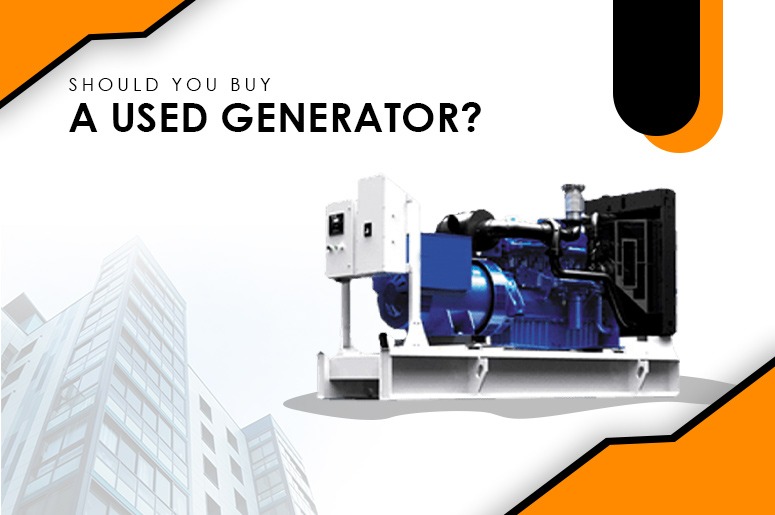
Buying a generator can be a worthwhile investment for any residential or commercial property. It can provide a backup source of power for a variety of applications in extreme weather conditions and critical situations. At home having a generator keeps you safe and comfortable. It allows you to use important appliances and devices such as your refrigerator, air condition, heater, security system, and communication devices. In business facilities, generators keep your essential equipment running and ensure the continuity of your business operations. For medical institutions, it can even help preserve the life of both patients and health care workers. But how about when it comes to getting a second-hand one? Should you buy a used generator or go for the brand new one?
Purchasing a generator costs a lot of money, especially if you are buying multiple units of the industrial type. While buying a new generator guarantees optimal product performance, there are other less expensive options you might want to consider. One route you can take is to try looking into purchasing a second-hand generator set. In this article, we will discuss some reasons why you should buy a used generator. We will also learn the things you need to watch out for to ensure your second-hand gen set will be worth your money.
Why Should You Buy A Used Generator
1. Price
The main reason people opt to buy used generators is that they are far cheaper than a brand new set. Similar to cars, the longer their running hours, the lower their price will get. If you need a standby power source for vital machines but have a limited budget, a second-hand generator is your best bet. You can use them through the end of their lifespan or until you can afford to buy a brand new set. If it’s your first time buying a generator, buying a used set can also help you better understand your needs first before investing in a large and expensive one.
2. Availability
When buying a used generator, you check the set on display, get it tested, and pay for it. You don’t need to wait for a particular product to be available, or for your order to arrive. If the particular generator you are looking for needs to be shipped overseas, finding their used counterparts will save you a lot of time and energy. And, if the generator you want is unavailable, your dealership is most likely to have a similar product available. They will offer another set that has been tested to work for your same power needs.
3. Maintenance Services

Many companies that sell used generator sets also offer maintenance and repair services. Used sets are more likely to require servicing and it’s great if your seller can help. Used generator dealerships have extensive knowledge of fixing and maintaining second-hand sets, so you can be sure your generator will be well-taken care of. Be sure to ask your dealership about this service, especially if they do not offer a warranty.
Things To Consider When Buying A Used Generator
1. Age And Usage
When buying a used generator, the first thing you need to ask your seller is its history. Ask about its age, running hours, and how it has been used. The age of a generator does not solely determine its reliability. Generators that have not been used frequently are expected to last longer. However, the performance of generators might also deteriorate if left unused for a long time, so remember to ask if the set has been regularly serviced and maintained. If this information is not available, it’s best to have the set thoroughly inspected and tested before using it.
2. Brand
Find out which generator brands are known for making reliable and long-lasting generators. Cummins, Onan, and Kohler are some of the good brands you can rely on. Also, make sure to choose a generator brand with easy-to-find parts. Since used sets usually still have their old factory parts, you need to make sure replacements are available when they stop working.
3. Signs of Damage
Inspect the generator’s physical appearance for signs of damage. Watch out for rust, holes, cracks, scratches, and wire damages. This could be mean that the generator was not properly maintained or was installed outdoors. It also means that it will be more susceptible to further damage. Choose a set that shows lesser signs of damage to ensure you are getting a generator that has been handled carefully and kept indoors. Look beyond the paint. You can easily repaint your generator for protection, but cracks and rust will only worsen over time.
4. Load Test
Before purchasing a used standby generator, make sure it has been load tested. Generators usually lose some of their operational power as they age and with frequent use. Through load testing, you will be able to determine the used generator’s actual operational capability and if it will fit your purpose.
Because of the savings, it is easy to see why buying a used generator is a tempting option. However, keep in mind that you will have very limited information on how the first owners used the generator set. So, there’s always a huge risk that you’ll be spending on hefty repair costs. Refer to the above things to consider before purchasing to lessen risks and make sure you’re getting value for your money. But, if you have the resources to get a new generator, there’s no reason why you should settle for a used one. Keep in mind that second-hand generators will never perform as well as a new set. It may be a huge investment, but it can save you time and money in the long run.
